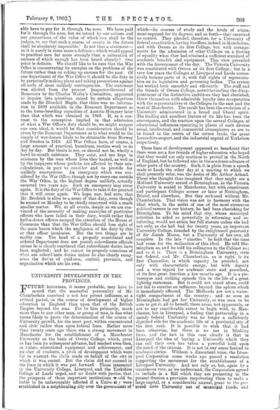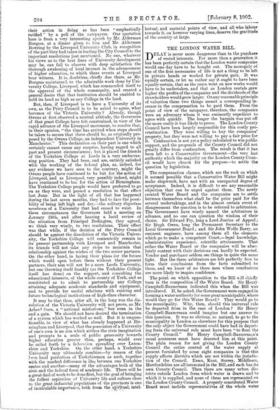UNIVERSITY DEVELOPMENT IN THE PROVINCES. F UTURE historians, it seems probable,
may have to record that the masterful personality of Mr. Chamberlain exercised a not less potent influence, at a critical period, on the course of development of higher education in England than upon that of the British Empire beyond the seas. For to him primarily, much more than to any other man, or group of men, is due what seems likely to prove the determination of the course of University growth, for the most part, within concentrated and civic rather than upon federal lines. Rather more than twenty years ago there was a strong movement in Manchester for the establishment of a Manchester University on the basis of Owens College, which, great as has been its subsequent advance, had reached even then, in riches, educational equipment and achievement, and nu nber of students, a pitch of development which went far to warrant the claim made on behalf of the city in which it xvaa seated. But the claim did not succeed in the form in which it was put forward. Those interested in the University College, Liverpool, and the Yorkshire College at Leeds urged, and no doubt with justice, that the prospects of those important institutions w mid be present Session a provision empowering them to make a liable to be unfavourably affected if a. Unive si y were large capital, or a considerable annual, grant to the pro- established in a neighbouring city over the government of nosed civic University out of municipal funds, and which—its courses of study and the levels of attain- ment required for its degrees, and so forth—they exercised no control. They pleaded, therefore, for a University of federal constitution, having itsoffices, indeed, in Manchester, and with Owens as its first College, but with arrange- ments for the admission of other Colleges on a footing of equality when they had attained a sufficient standard of academic breadth and equipment. This view prevailed with the Government of the day. The Victoria University was constituted with Owens as its first College ; but in a very few years the Colleges at Liverpool and Leeds succes- sively became parts of it, with full rights of representa- tion on its legislative and governing bodies. The system has worked both smoothly and efficiently. The staff and the friends of Owens College, notwithstanding the disa.p- pointment of the distinctive ambitions they had cherished, threw themselves with admirable loyalty into co-operation with the representatives of the Colleges to the east and the west of Manchester. The result has been the evolution of a University administered in a broad and liberal spirit. The leading and excellent feature of its life has been the convergence, and the reaction upon the several Colleges, of educational influences operating in places of such diverse social, intellectual, and commercial atmospheres as are to be found in the centre of the cotton trade, the great Lancashire seaport, and the industrial capital of Yorkshire respectively.
These lines of development appeared so beneficent that there were not a few friends of higher education who hoped that they would not only continue to prevail in the North of England, but be followed also in the academic advance of other parts of the country. Such, it is plain from a speech made at Leeds the .other day at a meeting to which we shall presently refer, was the desire of Mr. Arthur Acland. Those who thought thus imagined that they might see a Midland University seated at Birmingham, as the Victoria University is seated in Manchester, but with constituent and participant Colleges sooner or later at Nottingham, Bristol, and elsewhere. But they reckoned without Mr. Chamberlain. That vision was not in harmony with the ideal which, in the midst of one of the most strenuous political careers in our history, he had been cherishing for Birmingham. To his mind that city, whose municipal activities he aided so powerfully in reforming and re- inforcing, would not attain her full stature unless she had not only, as she had had for twenty years, an important University College, founded by the enlightened generosity of Sir Josiah Mason, but a. University of her own, all complete. In the late " nineties " he held that the time had come for the realisation of this ideal. He told Bir- mingham so, and he told his colleagues in the Cabinet so ; and so it is. There is a Birmingham University, civio not federal, and Mr. Chamberlain, as is right, is itt first Chancellor, in which capacity he presided, not only with characteristic energy, but with dignity and. a wise regard for academic state and precedent, at its first great function a few months ago. It is a pic- turesque and striking episode this in the life of a great fighting statesman. But it could not stand alone, could not fail to exercise an influence beyond the sphere which it immediately affected. The Midlands are not a water- tight compartment of the country ; and as soon as Birmingham had got her University, or was seen to be sure to get it, all to herself, there arose, not apparently, or not to any considerable extent to begin with, in Man- chester, but in Liverpool, a feeling that partnership in a merely federal University was no longer a sufficiently dignified role for the academic life of a provincial city of the first rank. It is possible to wish that it had been otherwise, but there is no use in blinking facts, and the fact in this case clearly is that in Liverpool the idea of having a University which they can call their own has taken a powerful hold upon the mind of the citizens. It is not in any sense limited to academic circles. Without a dissentient voice, the Liver- pool Corporation some weeks ago passed a resolution supporting the movement for the establishment of a Liverpool University. And not only so, but, again by a unanimous vote, as we understand, the Corporation agreed to include in a Bill which they are promoting in the their action in doing so has been "emphatically ratified" by a poll of the ratepayers. Our quotation here is from a very interesting speech by Mr. Alderman Burgess, at a dinner given to him and Mr. Alderman Bowring by the Liverpool University Club, in recognition of the part they had taken in leading the City Council to the important resolutions just mentioned. No one, whatever his views as to the best lines of University development may be, can fail to observe with deep satisfaction the thorough awakening of local interest in the advancement of higher education, to which these events at Liverpool bear witness. It is, doubtless, chiefly due there, as Mr. Burgess maintained, to the admirable work done by uni- versity College, Liverpool, which has commended itself to the approval of the whole community, and created a general desire that that institution should be enabled to hold its head as high as any College in the land.
But, then, if Liverpool is to have a University of its own, as the Privy Council is to be asked to agree, what becomes of the Victoria University ? Already, though Owens at first observed a neutral attitude, the Governors of that great College have felt constrained, in view of the rapid advance of the Liverpool movement, to resolve that, in their opinion, "the time has arrived when steps should be taken to secure that there should be, as originally pro- posed by the Owens College, an independent University in Manchester." This declaration on their part is one which certainly cannot cause any surprise, having regard to all past and present circumstances ; but it placed the friends of the Yorkshire College at Leeds in a very embarras- sing position. They had been, and are, entirely satisfied with the working of the federal plan, as, indeed, for any evidence we have seen to the contrary, might the Owens people have continued to be but for the action of Liverpool, and as Liverpool, very possibly indeed, might have continued to be but for the action of Birmingham. The Yorkshire College people would have preferred to go on as they were, and passed a resolution to that effect last June. But in the light of all that has happened during the last seven months, they had to face the possi- bility of being left high and. dry,—the solitary disjectum membrum of a University that had ceased to exist. In these circumstances the Governors held a meeting on January 24th, and after hearing a lucid review of the situation from Principal Bodington, they agreed, we think very wisely, to two resolutions. Their effect was that while, if the decision of the Privy Council should be against the dissolution of the Victoria Univer- sity, the Yorkshire College will contentedly remain in its present partnership with Liverpool and Manchester, its friends will not take any steps to maintain that relationship against the wishes of the two senior partners. On the other hand, in laying their plans for the future which would. open before them without their present partners, their aim will not be a mere Leeds University, but one throwing itself frankly (as the Yorkshire College itself has done) on the support, and. consulting the educational interests, of the whole county of York, and so constituted as to admit to partnership any College attaining adequate academic standards and equipment, and to provide for useful relations with existing and future technological institutions of high-class character.
• It may be that thus, after all, in the long run the dis- solution of the Victoria University will not prove, as Mr. A.ciand fears, a "national misfortune," but even in the end a gain. We should not have desired the termination of a system which has worked so well. But it is unques- tionable, in view of what has already happened at Bir- mingham and Liverpool, that the possession of a University of one's own is an aim which strikes the civic imagination and prompts to a scale of public genei osity towards higher education greater than, perhaps, would. ever be called forth by a federation spreading over Lanca- shire and Yorkshire. On the other hand, a Yorkshire University may ultimately combine—by reason of the keeu local patriotism of Yorkshiremen as such, together with the marked difference in ;i0oe between one Yorkshire centre and another—many of the advantages both of the civic and the federal form of academic life. There will be a great deal of work to be done first, but the goal of bringing the fullest aspiration of University life and culture close to the great industrial populations of the provinces is one of incalculable importance, both from the spiritual, intel- , lectual, and material points of view, and all who labour towards it, on however varying lines, deserve the gratitude of the country at large.











































 Previous page
Previous page